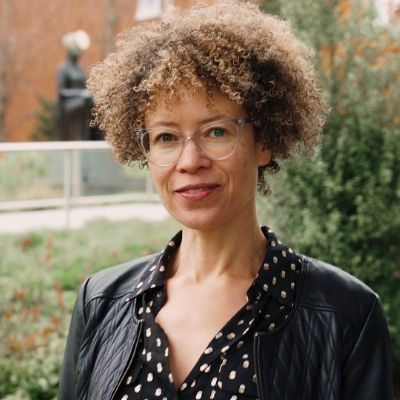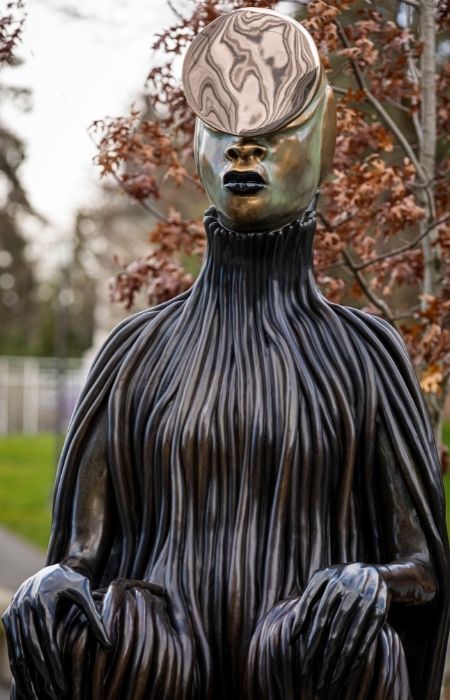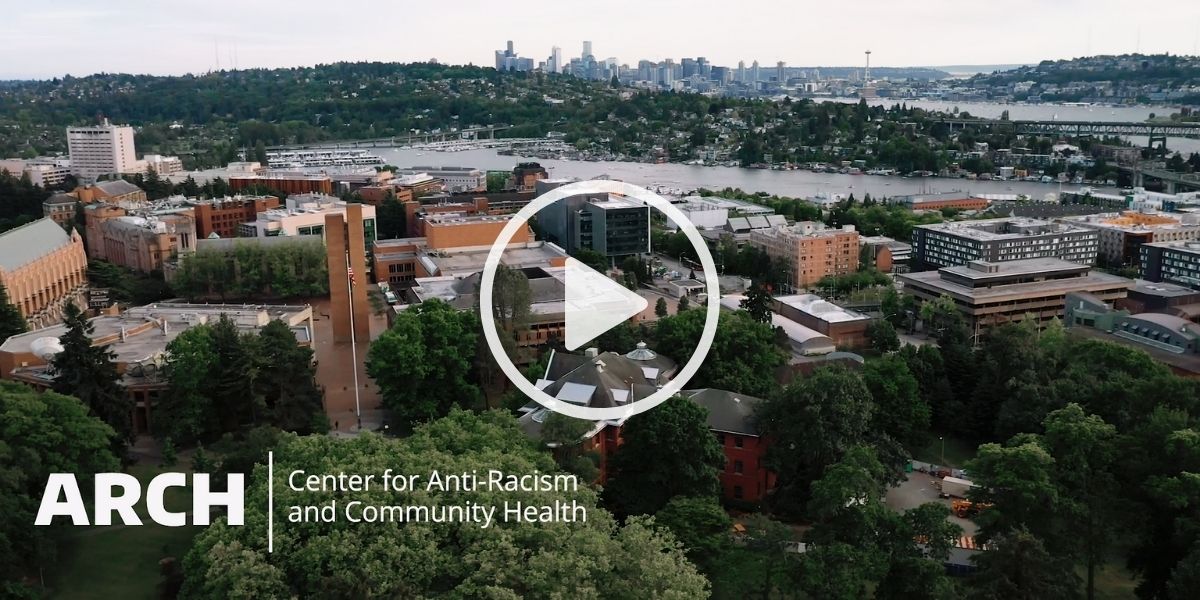UW School of Public Health announces
ARCH: Center for Anti-Racism and Community Health
Led by Dr. Wendy E. Barrington
Coinciding with this year’s Black History Month theme of “Black Health and Wellness,” today the University of Washington (UW) School of Public Health announces the launch of the Center for Anti-Racism and Community Health (ARCH).

Led by inaugural Director Dr. Wendy E. Barrington, the ARCH Center will serve as a community-driven academic hub focused on the critical interrogation and disruption of racism and racialization within systems while centering those most impacted by legacies of U.S. colonization.
“We will ground our approaches in the wisdom of Black and Indigenous peoples because current manifestations of structural racism in this country are rooted in historic harms to these communities,” says Dr. Barrington. “We will work in solidarity to address the experiences of racism and racialization of different communities from that position. We hope to be responsive to local and regional needs and contribute to a national agenda for health equity action.”
The goal of the ARCH Center is to co-develop a structure that includes opportunities for consultation, collaboration and partnership, advocacy and activism, and shared decision-making with Black and Indigenous communities as a form of reparations for legacies of slavery, genocide, and assimilation.
“Having the ARCH Center within the university dedicated to providing space for Black and Indigenous thought is so critical because it creates a home for the values and knowledge of communities who have historically and systematically not been served by higher education,” states Dr. Derek Jennings, an Assistant Professor in the Health Systems and Population Health department within the School of Public Health. His work includes building and creating new Indigenous knowledge around health and well-being. “I am hopeful that the ARCH Center will encourage and attract future scholars, creating a community of enlightenment around Black and Indigenous thought that will enact real change.”

Dr. Barrington is an Associate Professor in the departments of Health Systems and Population Health and Epidemiology within the UW School of Public Health. She is also an Associate Professor in the Child, Family and Population Health Nursing department within the UW School of Nursing. Dr. Barrington is a national public health leader whose work as a health disparities researcher and epidemiologist focuses on promoting healthy communities and addressing racial disparities in health service delivery and clinical outcomes.
Dr. Barrington’s expertise and interdisciplinary approaches uniquely position her to drive the ARCH Center’s vision. “I am reminded that the late Dr. Martin Luther King said ‘Of all of the inequalities, the inequality of health care is the most shocking’”, shares Winona Hollins Hauge, member of the Governor’s Washington State Pandemic Force. “The ARCH Center has a great responsibility to make a stand for Equity NOW!”
The ARCH Center will approach its work by authentically engaging communities in health promotion, collaborating with community health workers, and transforming health systems through policy and practice transformation to address racial disparities in health service delivery.
“Dr. Barrington has been a steadfast champion of instituting shared decision-making with communities who are most historically impacted by intersectional oppressions, for it is our communities who know the solutions,” states
In describing her lived experience as a biracial Black woman, Dr. Barrington states, “I recognize how colorism, an example of further racialization of Black communities, has afforded me privilege that has facilitated my navigation of white institutions. I am now in a position to use that privilege in service to communities impacted by structural racism. Having a dual identity where I am an insider-outsider in almost every space, I see that as a unique opportunity to champion equity.”

Since being named Director in the fall of 2021, Dr. Barrington has convened an interdisciplinary collective of Black UW students, faculty, staff, and community partners to begin designing the ARCH Center’s structure and identifying priorities. A convening of an equivalent collective to center experiences of Indigenous peoples is underway, and ARCH is engaging with sister anti-racism centers in schools of public health across the country to synergize and amplify anti-racist efforts nationally.
“I am very pleased the ARCH Center is finally launched and spearheaded by a strong, talented, and compassionate sister,” shares Ahoua Kone, Clinical Assistant Professor in Global Health and co-chair of SPH’s Equity, Diversity and Inclusion committee. “Given the circumstances and the landscape, I realize that the right moment for this work was not earlier – we were not ready. It is now. Our past has shaped our journey to a point where we can now expand our reach and impact under Dr. Barrington’s INSPIRED leadership. It is now our time to walk our talk and boldly act to dismantle racism while building solidarity at the same time.””
Guided by anti-racism, critical race theory, and community-based participatory research principles, the ARCH Center’s research will focus on testing strategies to break down mechanisms of structural racism while strengthening avenues for public health accountability to communities. Achieving these anti-racist goals requires a multi-pronged approach:
- supporting anti-racist literacy through co-design, implementation, and evaluation of trainings and curriculum
- recruitment of students, staff, and faculty from systematically marginalized and excluded communities
- restructuring institutional policies, practices, and social environments at UW.
The ARCH Center will pursue its goals through public health scholarship and partnerships with local public institutions, businesses, and communities.
Examples of community partnerships include ongoing projects with African American churches in Seattle as well as the Pandemic and Racism Advisory Group for Public Health Seattle-King County, the Community Health Board Coalition of King County, Washington State Department of Health, and several health systems across the state.
The ARCH Center was recently awarded a multi-year contract to implement an anti-racist evaluation of the Care Connect Washington program expansion. This program addresses barriers to COVID-19 recovery efforts by connecting participants to community resources. The anti-racist expansion of the program will include the implementation and evaluation of organizational change strategies to support
“The School of Public Health can make an even greater impact in achieving health equity when we build on the existing strengths of communities and train future public health professionals on anti-racist strategies,” comments India Ornelas, interim Chair of the Department of Health Systems and Population Health.
Through the UW School of Nursing Doctor of Nursing Practice program in Population Health and Systems Leadership, Dr. Barrington partnered with the African American Health Board of King County to co-design and delivered a new course offered in the fall of 2021 entitled, “Collaboration for Health Equity.” The course focused on Black reproductive health and taught ways to share power with communities as anti-racist strategies for master’s-level and doctoral students across epidemiology, nursing, education, and social work from both the UW Seattle and Bothell campuses.
"Of all of the inequalities, the inequality of health care is the most shocking"
"We must go further to prepare students and health professionals to transform the harms of racial inequality into justice for all,” shares
Dr. Barrington earned her Doctor of Philosophy in Epidemiology from the UW, her Master of Public Health degree in Epidemiology from the University of New Mexico, and her Bachelor of Science degree in Earth Systems from Stanford University. She joined the UW faculty in 2013 and is a recipient of the UW Distinguished Teaching Award, the highest UW honor conferred upon faculty. She is a steering committee member of the Association of Schools and Programs of Public Health’s Framing the Future 2030 initiative, a member of the Centers for Disease Control and Prevention’s Community Preventive Services Task Force, and a board member of the Intercultural Cancer Council. In addition, Dr. Barrington is engaged in cross-institutional collaborations with the Women’s Health Initiative and was recognized by the Seattle Section of the National Council for Negro Women for her work partnering with local communities to co-design solutions to cancer disparities.
“I strongly believe that orienting the ARCH Center around the disruption of racist mechanisms rooted in white supremacy culture norms that perpetuate anti-Blackness and anti-Indigeneity will expand our ability to rectify power imbalances experienced by racialized communities,” Dr. Barrington states. “We as a society are not healthy. We can do better by prioritizing structural changes that benefit those most impacted by racism. We can do better by centering, uplifting, and championing the strengths of racialized communities. In solidarity, every community will benefit from these strategies of radical inclusion.”
Learn more about the ARCH Center:

